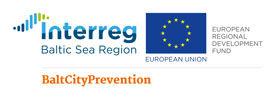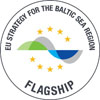Projects
Print > | Baltic Cities tackle lifestyle related diseases (BaltCityPrevention) |  |
The overall objective of the BaltCityPrevention project is a socio-economic innovation – a model for the prevention of lifestyle-related diseases in adolescents, which is beneficial for municipalities and state institutions responsible for health promotion. This model is based on the assumption that it is necessary to go where the users are and to observe their personal lifestyle, their habits and special needs. In the case of adolescents it means integrating modern information communication technology devices into health promotion activities.
Activities:
- Identifying the needs of municipalities and state institutions responsible for health promotion
- Development of a new innovative prevention model
- Assessment of tools to assess end users’ (adolescents’) needs
- Assessment of tools related to behaviour modification
- Assessment of tools to develop a new health e-application for health promotion
- Advancement of knowledge on how to adapt prevention activities to the needs of the end users
- Testing of an innovative prevention model and evaluation of the results
- Encouraging cross-border cooperation between municipalities, state institutions responsible for health promotion and small and medium-sized companies to improve health promotion activities
Lead Partner: Flensburg University of Applied Sciences, Germany
Project budget: 140 068,75 EUR, including 119 058,43 EUR ERAF Programme co-financing and 21 010,32 EUR TELEMEDICA contribution.
Project webpage: baltcityprevention.eu
Networking Platform for Public Health Authorities: betterprevention.eu
| Project name | „Biophotonics Research Group” |
| Lead Partner | University of Latvia |
| Short description | The aim of the study was to develop a photoplethysmography (PPG) related technique for local and regional circulatory bed assessment and to validate the capability of this technique for clinical course monitoring of septic patients. Role: participation in the conduct of clinical tests. |
| Project name | „Novel optical technologies for complex non-contact diagnostics of skin” |
| Lead Partner | University of Latvia |
| Short description | In frame of this project, a novel optical device for non-invasive assessment of skin, called SkImager, was developed. Role: constructive solution development for the diagnostic camera, experimental examinations of the prototype devices in laboratory and clinical observations, recommendations and technical specifications for the start-up of camera series production. |
| Project name | The „Chain of Trust” project |
| Lead Partner | European Patients’ Forum Standing Committee of European Doctors The Norwegian Centre for Integrated Care and Telemedicine |
| Short description | The European Patients’ Forum (EPF) together with six partners has performed the EU-project with the title “Chain of Trust – Understanding patients and health professionals’ perspective on Telehealth to build confidence and acceptance”. Role: participation in the End User Interest Group – the Evaluation of the project. Web: http://www.eu-patient.eu/whatwedo/Projects/Chain-of-Trust/ |
| Project name | „Connecting and supporting Health Care Professionals via ICT (PrimCareIT)” |
| Lead Partner | South Ostrobothnia Health Care District, Finland |
| Short description | The overall aim of PrimCareIT is to raise the attractiveness of remote primary health care for medical professionals by the means of tele-consultation and tele-mentoring. Thereby the project counteracts brain drain and professional isolation in sparsely populated areas for more equal access to primary health care in the Baltic Sea Region. Role: providing tele-consultations and tele-mentoring for health professionals in remote primary care. Web: www.primcareit.net |
